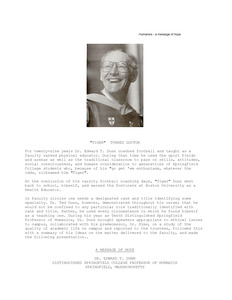Humanics- A Message of Hope - Dr. Edward T. Dunn (c. 1983)
Item Information
- Title:
- Humanics- A Message of Hope - Dr. Edward T. Dunn (c. 1983)
- Description:
-
This document titled “Humanics- A Message of Hope” is the Humanics Lecture that was given at Springfield College by the tenth Distinguished Professor of Humanics, Dr. Edward T. Dunn, on May 5, 1983. Dr. Edward T. Dunn coached football and taught physical education at Springfield College for twenty-nine years. He used the sport fields and arenas as well as the classroom to pass on skills, attitudes, social consciousness, and humane consideration to generations of students who, because of his “go get 'em” enthusiasm, whatever the odds, nicknamed him “Tiger.” At the conclusion of his varsity football coaching days Dunn went back to school and earned a Doctorate at Boston University as a Health Educator. During his year as Tenth Distinguished Springfield Professor of Humanics, Dr. Dunn brought guest speakers to campus to discuss ethical issues, he collaborated with his predecessor Dr. Sims on a study of the quality of academic life on campus, and he explained his own summary of his ideas about Humanics. Dunn begins his lecture by stating that his view of education is based on two principles: that education should “help” rather than “make” each person become something, and that the scope of education should be broad instead of specialized. He quotes: “There is only one subject matter for education and this is life, in all its manifestations…At best, it should prepare a person for a lifetime of learning.” Dunn states that the Springfield College education, which we say is based on a Humanics attitude or philosophy, is also founded on a broad approach. Dunn believes the fundamental principle behind a Humanics education is to help each person, who comes in contact with its influence, to develop a better attitude toward life, as well as a better quality of life-style through the development of his/her total person in the multi-dimensions of the spirit, mind and body. He goes on to explain that high-level wellness, which is used in present day literature, is the concept of "wholistic" health and is the model for the Humanics concept of education. Dunn says that the Humanics philosophy Springfield College can be carried on by teachers who try to live lives directed toward high-level wellness which will serve as building blocks in the Humanics model for further development in future generations. Dunn believed these teachers would act as the prototypes who would illustrate Henry Paar's definition of a person doing Humanics as, “One who practices uncelebrated humane contacts.” Examples of such people at Springfield College, according to Dunn, are Jesse Parks, Barbara Jensen and Diane Potter. Dunn finishes his lecture with a brief glimpse into the examination of his own life as well as a thank you to the faculty that elected him for the Distinguished Professor of Humanics position.
- Creator:
- Dunn, Edward (Ted)
- Date:
-
May 5, 1983
- Format:
-
Documents
- Location:
- Springfield College Archives and Special Collections
- Collection (local):
-
College Archives Digital Collections
- Series:
- Distinguished Professor of Humanics Collection
- Subjects:
-
Humanics
Springfield College
Springfield College--Faculty
Springfield College--Alumni and alumnae
Dunn, Edward (Ted)
- Places:
-
Massachusetts > Hampden (county) > Springfield
- Extent:
- 9 Pages
- Link to Item:
- https://cdm16122.contentdm.oclc.org/cdm/ref/collection/p15370coll2/id/6655
- Terms of Use:
-
Text and images are owned, held, or licensed by Springfield College and are available for personal, non-commercial, and educational use, provided that ownership is properly cited. A credit line is required and should read: Courtesy of Springfield College, Babson Library, Archives and Special Collections. Any commercial use without written permission from Springfield College is strictly prohibited. Other individuals or entities other than, and in addition to, Springfield College may also own copyrights and other propriety rights. The publishing, exhibiting, or broadcasting party assumes all responsibility for clearing reproduction rights and for any infringement of United States copyright law.
Contact host institution for more information.
- Publisher:
-
Springfield College
- Language:
-
English
- Notes:
-
Humanics is a word that has a special meaning in the history and philosophy of Springfield College, as well as in the college’s motto of “Spirit, Mind, and Body.” The Oxford English Dictionary defines Humanics as, “the subject or study of human affairs or relations, especially of the human element of a problem or situation as opposed to the mechanical.” In 1962, Dr. Glenn Olds, President of Springfield College at the time, began to wonder why this name was given to the intended philosophy of the college by Dr. Laurence Locke Doggett, Springfield College’s first full-time president. Olds acknowledged that the practices of the faculty were in large part consistent with the Humanics philosophy, but he believed that a more self-conscious application would improve chances of its continuity and survival. To ensure this, a Distinguished Professor of Humanics position was created at the college, first filled by Dr. Seth Arsenian from 1966-1969. The purpose of this position was to catalyze a renewal of consciousness in the philosophy. This was done by annually mandating the Distinguished Professor of Humanics to give a Humanics lecture on the definition of Humanics and what the concept means to them. Arsenian started this tradition in 1967 with his speech titled, “The Meaning of Humanics,” in which he described the concept as a set of ideas, values, and goals that make our college distinct from other colleges and make commitment and unity toward commonly sought goals possible.
- Identifier:
-
Dunn_Humanics _A Message of Hope




